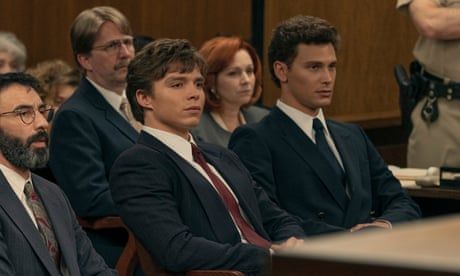
Ryan Murphy’s follow-up to Netflix hit Dahmer tells a compelling true story but grabby moments and high class acting can’t save an overlong and repetitive re-litigation
Back in the tabloid-crazed 90s, the major networks would often fill airtime with hastily produced movies based on various tawdry or sensational news stories: the gun-toting adulteress Amy Fisher, the assaulted skater Nancy Kerrigan, the parent-murdering Menendez brothers, and, of course, OJ Simpson. In the streaming era, these stories – long stripped of their quickie currency – are often re-evaluated and expanded into deep-dive miniseries, going for some level of prestige rather than a cheaply attained ratings share. No one has become more prolific at this form of cultural retooling than the producer Ryan Murphy, to the point where it can be difficult to keep all of his anthology series straight. Are the Menendez Brothers filed under American Crime Story, at FX? Or Monster, on Netflix? Is American Horror Story off limits? That’s what many of these are, after all: real-life horror stories, re-enacted by A-list ensembles.
As it happens, the Menendez brothers have the dubious honor of following Jeffrey Dahmer for the second season of Netflix’s Monster, now pluralized to Monsters: The Lyle and Erik Menendez Story. Over the course of nine episodes, Murphy and his frequent collaborator Ian Brennan explore the history and psychology surrounding Erik (Cooper Koch) and Lyle (Nicholas Alexander Chavez), who were convicted of killing their parents José (Javier Bardem) and Kitty (Chloë Sevigny). The first episode casts a wide net, following the brothers in the weeks following the 1989 murder, before their arrest – it kicks off with a supremely awkward funeral at a Director’s Guild facility, because José was in the movie business – and jumping back to short flashbacks of familial dysfunction, murder planning and the killing itself. Right from the start, there’s a tension, not always productive, between Murphy’s tendencies toward campy, gawking horror and the steadier gaze of the film-makers he employs, including the noir specialist Carl Franklin (who directs the first two episodes).
Continue reading...